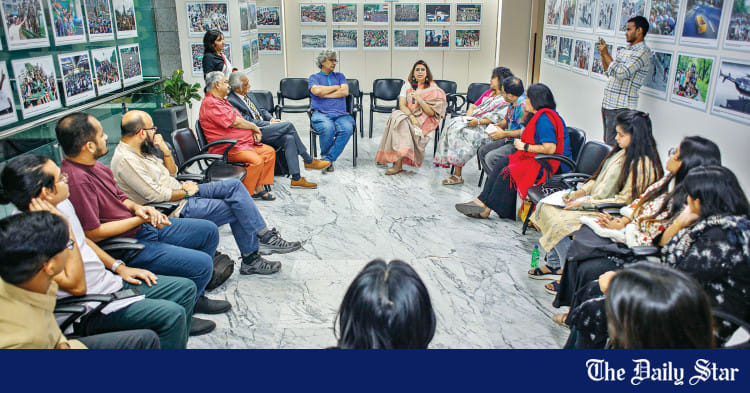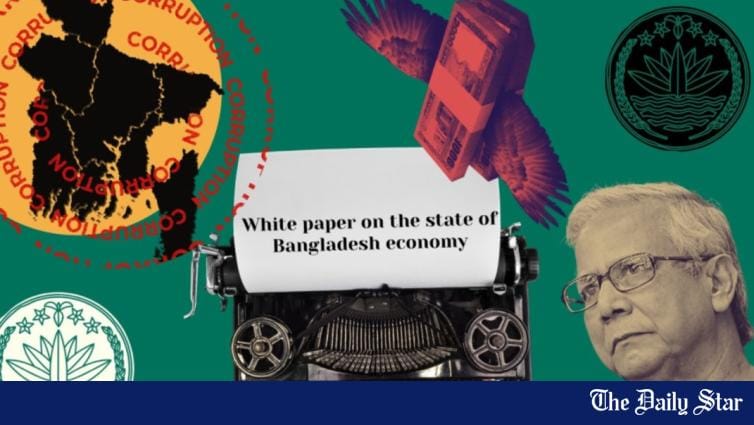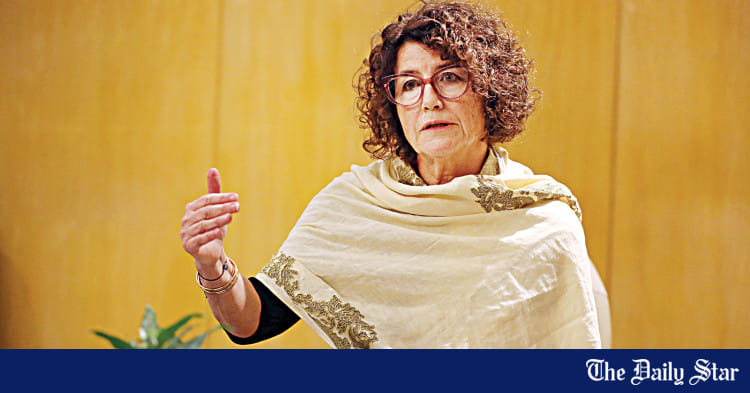Saif
Senior Member
- Messages
- 15,397
- Nation

- Axis Group


Reimagining reform: civic engagement
THE July uprising of 2024 marked a pivotal turning point in our nation’s history, a moment when people collectively voiced their frustrations against systemic inequalities, unresponsive governance, and widespread corruption. The events of that revolutionary monsoon were not just an eruption of...
 www.newagebd.net
www.newagebd.net
Reimagining reform: civic engagement
Mohammad Jashim Uddin 01 December, 2024, 00:00

Protesters hold celebrations at Shahbagh in Dhaka on August 5 after the fall of the Awami League government. | Agence France-Presse/Munir uz Zaman
THE July uprising of 2024 marked a pivotal turning point in our nation’s history, a moment when people collectively voiced their frustrations against systemic inequalities, unresponsive governance, and widespread corruption. The events of that revolutionary monsoon were not just an eruption of anger but a call for meaningful change and societal reform. At its core, the uprising highlighted the power of civic engagement — individuals and communities coming together to demand accountability, propose solutions, and reshape the social contract. Now, as the dust settles, the real work begins — reimagining reform by channelling the energy of civic engagement into sustainable, transformative change.
Civic engagement is the cornerstone of a functioning democracy. It encompasses actions that enable citizens to contribute to the betterment of their communities, whether through grassroots activism, public dialogue, policy advocacy, or participating in electoral processes. The July uprising was a testament to the power of collective civic action, demonstrating how ordinary people can challenge the status quo and push for systemic reform. But for true transformation, this engagement must evolve from protest to participation, ensuring that citizens remain actively involved in shaping the policies and structures that govern their lives.
In the wake of the uprising, people’s expectations for reform are clear: they demand transparency, justice, and inclusivity. The movement has underscored the need for governance that reflects the will of the people and prioritises their needs over entrenched interests. This involves addressing the following critical areas:
Trust in institutions: Public trust in governmental and social institutions has eroded over the years due to corruption, inefficiency, and a lack of accountability. Civic engagement can play a key role in rebuilding this trust. Citizen-led watchdog groups, participatory budgeting, and open data initiatives can ensure that institutions operate transparently and responsibly.
Social equity and inclusion: The July uprising shone a spotlight on the marginalisation of vulnerable groups. Reform must prioritise inclusivity, addressing disparities in education, healthcare, and employment opportunities. Civic movements can amplify the voices of under-represented communities, advocating for policies that promote social equity.
Youth and education as catalysts for change: The energy and determination of the youth were instrumental in the uprising. Harnessing this momentum requires reforms in the education system to promote civic literacy, critical thinking, and leadership skills. Schools and universities must become spaces for dialogue and innovation, empowering the next generation to actively engage in societal reform.
Economic justice and opportunity: Economic disparities were a major driver of the uprising. Reform must address the structural inequalities that perpetuate poverty and unemployment. Civic engagement can play a role here by fostering community-based economic initiatives, supporting local businesses, and advocating for fair labour practices.
Environmental stewardship and sustainability: No vision for reform is complete without addressing the pressing need for environmental sustainability. Civic movements can push for policies that prioritise renewable energy, sustainable development, and the preservation of natural resources for future generations.
The July uprising demonstrated the strength of grassroots movements in mobilising communities and driving change. These movements operate outside traditional power structures, giving voice to those who are often overlooked by mainstream politics. Moving forward, grassroots organisations must continue to play a central role in the reform process, fostering local solutions to national problems and bridging the gap between citizens and policymakers.
Grassroots efforts can also inspire innovation in governance. Participatory democracy models, such as citizen assemblies or town hall meetings, can ensure that diverse perspectives are included in decision-making processes. By creating platforms for dialogue and collaboration, these initiatives can help build a more inclusive and responsive society.
Technology offers new opportunities for civic engagement and reform. Digital platforms can facilitate communication, organise movements, and hold leaders accountable. In the aftermath of the uprising, technology must be leveraged to ensure that the momentum for change is not lost. Online petitions, social media campaigns, and civic tech tools like open data portals can enable citizens to monitor progress, share ideas, and collaborate on solutions.
However, the use of technology must be accompanied by measures to address digital divides and misinformation. Ensuring access to technology for all citizens, particularly in rural and underserved areas, is critical to fostering inclusive civic participation.
While the energy of the uprising is vital, sustainable reform requires translating civic action into policy change. This involves fostering a culture of accountability and collaboration between citizens, civil society, and government institutions. Mechanisms such as public consultations, citizen advisory councils, and participatory policy development can institutionalise the principles of civic engagement, ensuring that reform is not just a response to crisis but an ongoing process.
Reimagining reform through civic engagement is not without its challenges. Resistance from entrenched power structures, the risk of co-optation by political agendas, and the fatigue of sustained activism can hinder progress. Overcoming these obstacles requires persistence, solidarity, and a commitment to shared values.
Leadership is also crucial. Reform efforts need champions — individuals and organisations that can inspire trust, bridge divides, and guide the process of change. These leaders must embody the principles of civic engagement, prioritising collaboration and inclusivity over personal gain.
The July uprising was a wake-up call, a reminder that the power to shape a nation lies in the hands of its people. As we move forward, civic engagement must remain at the heart of the reform process. By fostering a culture of participation, inclusivity, and accountability, we can reimagine a society that reflects the aspirations and needs of its citizens.
Reforming a nation is not a one-time event but a continuous journey. It requires the collective efforts of individuals, communities, and institutions working together towards a shared vision of justice, equity, and progress. The July uprising has given us an opportunity to reimagine what is possible. Let us seize this moment to build a future that honours the sacrifices and hopes of all who have fought for change.
Mohammad Jashim Uddin is an associate professor of English at the Northern University Bangladesh.
Mohammad Jashim Uddin 01 December, 2024, 00:00
Protesters hold celebrations at Shahbagh in Dhaka on August 5 after the fall of the Awami League government. | Agence France-Presse/Munir uz Zaman
THE July uprising of 2024 marked a pivotal turning point in our nation’s history, a moment when people collectively voiced their frustrations against systemic inequalities, unresponsive governance, and widespread corruption. The events of that revolutionary monsoon were not just an eruption of anger but a call for meaningful change and societal reform. At its core, the uprising highlighted the power of civic engagement — individuals and communities coming together to demand accountability, propose solutions, and reshape the social contract. Now, as the dust settles, the real work begins — reimagining reform by channelling the energy of civic engagement into sustainable, transformative change.
Civic engagement is the cornerstone of a functioning democracy. It encompasses actions that enable citizens to contribute to the betterment of their communities, whether through grassroots activism, public dialogue, policy advocacy, or participating in electoral processes. The July uprising was a testament to the power of collective civic action, demonstrating how ordinary people can challenge the status quo and push for systemic reform. But for true transformation, this engagement must evolve from protest to participation, ensuring that citizens remain actively involved in shaping the policies and structures that govern their lives.
In the wake of the uprising, people’s expectations for reform are clear: they demand transparency, justice, and inclusivity. The movement has underscored the need for governance that reflects the will of the people and prioritises their needs over entrenched interests. This involves addressing the following critical areas:
Trust in institutions: Public trust in governmental and social institutions has eroded over the years due to corruption, inefficiency, and a lack of accountability. Civic engagement can play a key role in rebuilding this trust. Citizen-led watchdog groups, participatory budgeting, and open data initiatives can ensure that institutions operate transparently and responsibly.
Social equity and inclusion: The July uprising shone a spotlight on the marginalisation of vulnerable groups. Reform must prioritise inclusivity, addressing disparities in education, healthcare, and employment opportunities. Civic movements can amplify the voices of under-represented communities, advocating for policies that promote social equity.
Youth and education as catalysts for change: The energy and determination of the youth were instrumental in the uprising. Harnessing this momentum requires reforms in the education system to promote civic literacy, critical thinking, and leadership skills. Schools and universities must become spaces for dialogue and innovation, empowering the next generation to actively engage in societal reform.
Economic justice and opportunity: Economic disparities were a major driver of the uprising. Reform must address the structural inequalities that perpetuate poverty and unemployment. Civic engagement can play a role here by fostering community-based economic initiatives, supporting local businesses, and advocating for fair labour practices.
Environmental stewardship and sustainability: No vision for reform is complete without addressing the pressing need for environmental sustainability. Civic movements can push for policies that prioritise renewable energy, sustainable development, and the preservation of natural resources for future generations.
The July uprising demonstrated the strength of grassroots movements in mobilising communities and driving change. These movements operate outside traditional power structures, giving voice to those who are often overlooked by mainstream politics. Moving forward, grassroots organisations must continue to play a central role in the reform process, fostering local solutions to national problems and bridging the gap between citizens and policymakers.
Grassroots efforts can also inspire innovation in governance. Participatory democracy models, such as citizen assemblies or town hall meetings, can ensure that diverse perspectives are included in decision-making processes. By creating platforms for dialogue and collaboration, these initiatives can help build a more inclusive and responsive society.
Technology offers new opportunities for civic engagement and reform. Digital platforms can facilitate communication, organise movements, and hold leaders accountable. In the aftermath of the uprising, technology must be leveraged to ensure that the momentum for change is not lost. Online petitions, social media campaigns, and civic tech tools like open data portals can enable citizens to monitor progress, share ideas, and collaborate on solutions.
However, the use of technology must be accompanied by measures to address digital divides and misinformation. Ensuring access to technology for all citizens, particularly in rural and underserved areas, is critical to fostering inclusive civic participation.
While the energy of the uprising is vital, sustainable reform requires translating civic action into policy change. This involves fostering a culture of accountability and collaboration between citizens, civil society, and government institutions. Mechanisms such as public consultations, citizen advisory councils, and participatory policy development can institutionalise the principles of civic engagement, ensuring that reform is not just a response to crisis but an ongoing process.
Reimagining reform through civic engagement is not without its challenges. Resistance from entrenched power structures, the risk of co-optation by political agendas, and the fatigue of sustained activism can hinder progress. Overcoming these obstacles requires persistence, solidarity, and a commitment to shared values.
Leadership is also crucial. Reform efforts need champions — individuals and organisations that can inspire trust, bridge divides, and guide the process of change. These leaders must embody the principles of civic engagement, prioritising collaboration and inclusivity over personal gain.
The July uprising was a wake-up call, a reminder that the power to shape a nation lies in the hands of its people. As we move forward, civic engagement must remain at the heart of the reform process. By fostering a culture of participation, inclusivity, and accountability, we can reimagine a society that reflects the aspirations and needs of its citizens.
Reforming a nation is not a one-time event but a continuous journey. It requires the collective efforts of individuals, communities, and institutions working together towards a shared vision of justice, equity, and progress. The July uprising has given us an opportunity to reimagine what is possible. Let us seize this moment to build a future that honours the sacrifices and hopes of all who have fought for change.
Mohammad Jashim Uddin is an associate professor of English at the Northern University Bangladesh.




